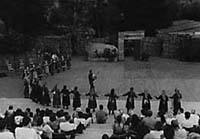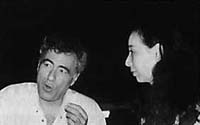AN INTERVIEW WITH
ERIKA AKOH AND ALKIS RAFTIS
SERIES NUMBER ONE
The difference between a spectacleand a drama in the dance
Interviewer Takashi Iijima
In a scorching heat of a temperature way above 30 degrees, "The 13th Annual Intemationai Dance Conference" was held with the main theme, "The Science of Artistic Dance" , in Athens at Dora Stratou Theater from July 7th through the 11th, with participants from over 10 different countries, 200 dance researchers, dancers, and cheoreographers. Most of the participants were researchers who were interested in "Folk Dance". During the day, there was a 5 hours session where researchers presentations were given, especially about "Greek Dance". And of course, there were ballet and modern dance researchers who made presentations, but everyone of them specified the importance, "back to basics" which is the origin of "folk dance". The researchers compared the cultural differences where ballet, modern dance had progressed over the years and stressed the necessity to go back to its original. Therefore, the main theme for this conference "The Science of Artistic Dance" was focused and represented as "The Science of Artistic Folk Dance".
For this purpose, as a chairman of this conference since 1987, Prof. Alkis Raftis led the researchers from all over the world through "Greek Dance to be aware of what "folklore" should be.He himself and other researchers all have a strict point of view and continue to have that and consequently everyone feels it's a necessity.
Prof. Raftis not only does his work in Greece but goes all over the world to collect informations on Greek societies living abroad but also consider and maintain the importance of the original form of Greek dance to the next generation.
Then why is Prof. Raftis putting emphasis on the Japanese modern dancer, Erika Akoh. Why is he inviting her for the past 3 years to his conference. Why did Erika Akoh continue to perform "The Hiroshima Panels" 1997, "Sansho Dayu" 1998, and "Adachigahara"1999.
We may be able to know their relationship from Erika Akoh's performance and Prof. Raftis's objective of his artisitic dance.
From this issue, we would have a series publications of "An Interview with Erika Akoh and Alkis Raftis". (This interview was held at Dora Stratou Theater right after Erika Akoh's performance, "Adachigahara" where Greek Dance is still performing with songs and music in the background.)
From "The Hiroshima Panels"
to "Adachi gahara"
What we can see from Erika Akoh's 3 years
- Interviewer:
- I deeply appreciate to have this interview in spite of your busy schedule. As for Prof. Raftis, the conference is near to the finale and for Erika Akoh right after the performance. I would like to start the first series of interview based on the cheoreographer, Erika Akoh's performance "Adachigahara", that we just saw now. I want to ask questions to Prof. Raftis why he is interested in Erika's performance and what is he expecting from her. I hope this will enable us to understand Prof. Raftis artistic values of dance. Please begin, Erika.
- Akoh:
- Since I have just finished my performance, I would like to appreciate for always supporting me. How was my dance, "Adachigahara" which was based from the Japanese classic noh dance?
- Prof.Raftis:
- I was very impressed by it. I don't have the chance to see this kind of performance. I felt the exoticism and the deep passion through the dance. I can't express exactly what kind of feeling that I got, but it was a strong and powerful one.
- Akoh:
- In brief, what kind of feeling did you perceive ?
- Prof.Raftis:
- In ancient Greek theater, one of the important elements was especially the tragic element. The performances that I have seen, "The Hiroshima Panels", "Sansho Dayu", certainly had the theatrical elements. In Europe, there are many dances which have theatrical elements. But when I first saw her perform, I felt that she is one of the few special dancers who could describe and express precisely with the theatrical elements and the tragic elements combined.
- Akoh:
-
All of my dances that I had performed. "The Hiroshima Panels" or "Yabunonaka","Sansho Dayu" were based on a folk story and the main character was always a victim. On this last performance, I was an assailant for the first time. Prof.Alkis always encourages me to choreograph a dance with a dramatic elements of both Japanese theater and Greek tragedy. I've really wanted to choreograph for this time, but unfortunately my schedule didn't allow me to, so I chose the theme from the Japanese classical "Noh" among other alternatives. thought "Noh" would be quite familiar with the Greek tragedies. I choreographed my latest performance with my theatrical intentions which wasn't to follow the legendary pattern where the devil woman would be killed by the prayers of the monks, but instead she would change into a goddess. (Many people from the audience who were watching Erika Akoh's performance interrupts the interview by giving their responses and impression about the dance to Erika Akoh. Erika Akoh replies respectfully.)

Greek Dance - Prof.Raftis:
- Absolutely. I'm satisfied with this performance. The other two performances were related where she portrayed and choreographed the tragedy which was emphasized on the woman's standpoint-with a liberal woman's point of view. But on this performance, she wore a mask. In ancient Greek tragedies, mask has a lot to do on the important roles. It was natural that she wore the mask. By the mask, the more tragic effects is to be portrayed. Moreover, the audience was surprised with her appearance. It turned out to be very effective and very interesting. By this, it highlighted the intentions of her choreograph. As I mentioned previously, the strong feeling that I perceived was relative in many ways. The mask was used to portray the tragedy of the main character. Even though there wasn't any movement of the opposing monks for several minutes, the audience could perceive a strong impact from that motionless stage. Yet there was some parts that needs to be rearranged, I would like to praise highly for her work. (The Greek Dance of this day ended and many people from the audience came up and greeted Prof.Raftis. Prof.Raftis responds to them courteously.)
- Interviewer:
- What do you think about the direction that she is pursuing and your expectations in the future?
- Prof.Raftis:
- I am deeply satisfied with her making a step forward everytime. Definitely she is making a progress and had accomplished the "The Hiroshima Panels", "Sansho Dayu" and every time she has been making a better result besides bringing herself to the right direction. This step forward is the most important thing. This International Dance Conference has been over 13 years but I have never invited anyone except Erika Akoh's group as a dance performer. Let me repeat, my first impression after I saw her perform, I realized that she is one of the few dancers who can portray and materialize the theatrical elements with the tragical elements, and I deeply feel that way even more now. What I expect from her is that I want her to choreograph Greek tragedy into her dance, but it would need a long time to do this. But I want her to have more confidence in herself and move forward. And I want her to perform again on this stage.
- Interviewer:
- But it will cost a lot of money. Erika, is your stage expense or the expense to come to Athens paid by yourself?
- Akoh:
- Unfortunately, everything is paid by myself. Not only this theater but in the suburb of Greece, Israel, and other countries want me to perform, but the expense is really the big problem so I haven't accomplished that yet.
- Interviewer:
- Prof. Raftis. Will there be any support in expenses for her from now?
- Prof.Raftis:
- Our organization is a non-profit organization so all of the participants come here by there own expense. Therefore, there would be no financial support for anyone and that is the same with Akoh's group. However, I would like to request support through the Japanese Embassy. The Japanese Embassy personnel told me that the International Relationship Foundation is the window for this kind of things. I want Erika Akoh to study about the Greek tragedy by staying here for a year or two and do some research and tryouts.
- Akoh:
- Thank you very much for many things. I would promise to make and perform Greek tragedy into my dance.
- Interviewer:
- I would like to end this session for now. I assume that the readers could understand the intentions of Prof.Raftis concerning Erika Akoh. The next issue will be about Prof. Raftis's profile and about himself.

Alkis Raftis and Erika Akoh

